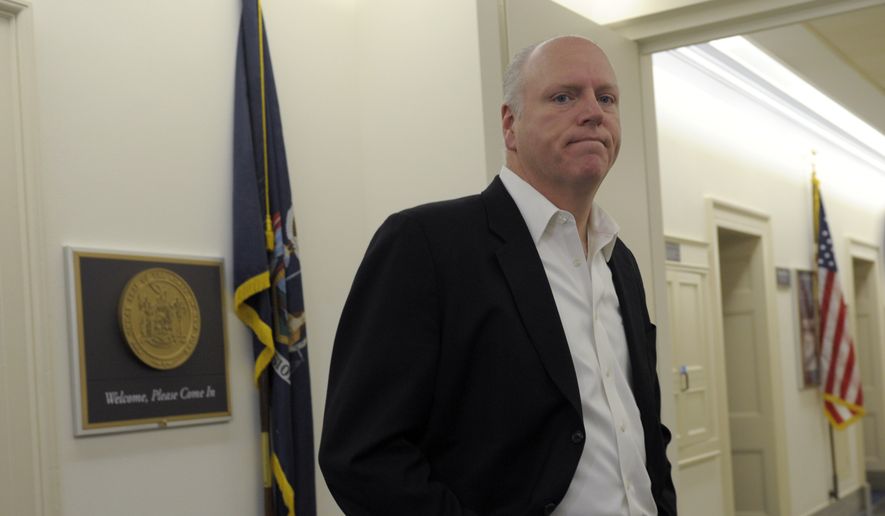Lacking the troops to block the GOP’s health care bill on their own, Democrats are looking for help this week from their ideological opponents on the right, knowing the best chance for sinking the Obamacare repeal lies with Republican rebels.
House Democrats say they don’t agree with their reasoning, but they are pleased that members of the House Freedom Caucus are trying to torpedo the bill worked out by President Trump and House Speaker Paul D. Ryan.
“I am not looking gift horses in the mouth these days,” said Rep. Joe Crowley, chairman of the House Democratic Caucus.
Democrats have said none of their members will vote for the GOP bill. They want to see an expansion of the 2010 Affordable Care Act, not a repeal.
But they’re in the minority, and their chances for victory depend entirely on finding common cause with Republican who say the GOP doesn’t go far enough in its repeal.
According to the latest math, all Democrats will need to be joined by 22 Republican defectors to doom the GOP’s bill.
Rep. Mark Meadows, head of the very conservative House Freedom Caucus, told reporters Wednesday that there are more than enough of his members poised to vote “No.”
They are hoping to force Republican leaders to go back to the negotiating table to tilt the bill even further to the right, looking to undo more of Obamacare and expand free-market based alternatives.
Democrats, though, are counting on conservatives to poison the debate altogether, leaving Obamacare intact.
On Wednesday, Rep. Chris Collins, New York Republican and top ally of President Trump, ripped hardline conservative members who have indicated they will give the bill a thumbs down.
“They’re about to torpedo our entire party and the presidency of Donald J. Trump,” Mr. Collins said on the John Fredericks Show. “I’m just frustrated, as are many of my other fellow Republicans here, and I just hope they see the light or there’s enough arm-twisting that they come on board.”
Asked whether he was cheering for the House Freedom Caucus to blow up the bill, Rep. Luis Gutierrez of Illinois chuckled at the question.
“Do I want them to be successful?” Mr. Gutierrez said. “From a purely personal point of view, yeah, I do because I don’t want millions of people to lose their health care. So if you want to think that my goals and their goals — although for different reasons — happen to coincide, yeah, they do coincide.”
He added, “If the Freedom Caucus is successful, I would thank them for saving millions of people from losing their health care.”
Rep. Keith Ellison, deputy chairman of the Democratic National Committee and co-chair of the Progressive Congressional Caucus, said Democrats have not tried to build “operational alliances” with the House Freedom Caucus on the issue of health care, as they have done on trade in the past.
“We have opposite reasons for going ’No,’ but I’d say look at least they are operating out of principle,” the Minnesota Democrat said.
Rep. Raul Grijalva, the other co-chair of the Progressive Caucus, said the House Freedom Caucus controls the fate of the bill — though he stopped short of saying he is cheering them on.
“For probably diametrically different reasons, we find ourselves not supporting this piece of legislation,” he said.”But you know, as I have found out, whether you are progressive or not, sometimes taking a stand that is based on your principles and your political philosophy can be difficult when the tide is not in your political direction, and I know they are going to be under a lot of pressure.”
That is why Rep. Ruben Gallego believes Democrats should not get too invested in the idea that the Freedom Caucus will hold the line with them against the bill.
“The joke around here is that it is the House Freedom Caucus-ish because they tend to go to the brink of bravery and then look over the edge and not do anything in the end,” the Arizona Democrat said.
Whatever the case, Mr. Grijvala said people should not read too much into what the vote says about the relationship between the members of the progressive and freedom caucuses.
“Trust me there will be enough differences to make up for this one,” he said.
• David Sherfinski contributed to this report.
• Seth McLaughlin can be reached at smclaughlin@washingtontimes.com.




Please read our comment policy before commenting.